Celebrating 1,000th grad, Class of 2016 enjoys commencement
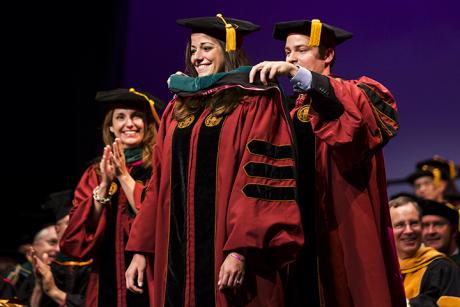
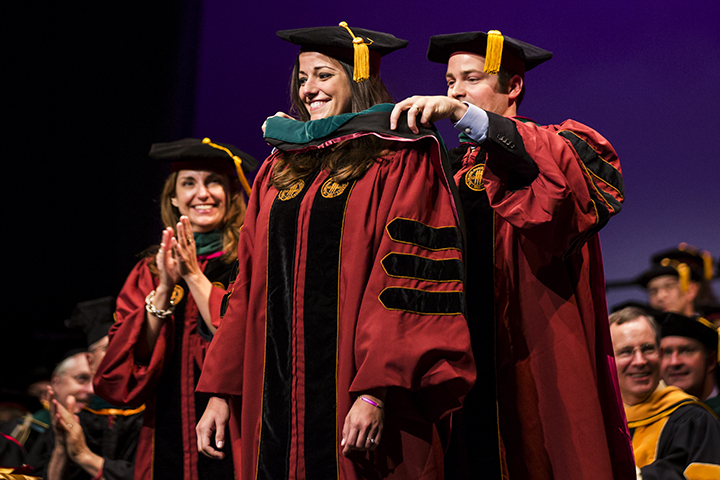
May 21, 2016
One by one the graduates crossed the Ruby Diamond Concert Hall stage this morning, under the watchful eye of Dean John Fogarty and President John Thrasher, just as they’d rehearsed it — until it was Elizabeth Coughlin’s turn. Everything stopped. She looked stunned, as in: “Wait a minute. What’s going on?”
Then alumnus Joda Lynn was called to the front of the stage. Back in 2000, he was declared the first student accepted by the brand-new FSU College of Medicine. Today, he was enlisted to help celebrate another milestone: Coughlin was declared the 1,000th College of Medicine student to receive her M.D., and he was there to “hood” her. That is, to stand behind her and outfit her with the ceremonial hood that marks the transition from student to alumna (right).
For a young medical school, it was a big deal. And it was one of numerous moments that made the morning unforgettable for a roomful of 119 grads, plus faculty members, staff members and wildly cheering relatives and friends.
Now the newly minted M.D.s will make the journey from fourth-year veterans at medical school to first-year rookies at their residency programs. Commencement speaker and Department of Clinical Sciences Chair Ricardo Gonzalez-Rothi (below) prepared a whimsical bag of special items to ease that scary transition. First item?
 “A packet of attitude-adjustment powder,” he told the grads. “Dissolve in liquid and drink twice daily. A good attitude is the most indispensable item. Without it you are destined to fail miserably. You will not be happy, and others will be unhappy with you. Things are bound to happen to you and to your patients that you have not expected, some of which you can’t change. If you cannot change what happened, it is always in your power and under your control to change your attitude about it. Remember that.” (See entire speech below.)
“A packet of attitude-adjustment powder,” he told the grads. “Dissolve in liquid and drink twice daily. A good attitude is the most indispensable item. Without it you are destined to fail miserably. You will not be happy, and others will be unhappy with you. Things are bound to happen to you and to your patients that you have not expected, some of which you can’t change. If you cannot change what happened, it is always in your power and under your control to change your attitude about it. Remember that.” (See entire speech below.)
Two months ago these students learned which residency program would be their home for the next three or more years, depending on their specialty. More than half of them are pursuing primary care. More than 40 percent matched in Florida, thanks in part to residency programs the College of Medicine has established with partners throughout the state. Whether in Florida or not, the students matched in top programs – including Columbia, Dartmouth, Wake Forest, Yale and many more.
After praising their performance on various standardized exams, Fogarty said: “It is clearly no surprise that you matched at outstanding residency programs. I continue to hear great things from more and more program directors about how good FSU students are and how to get more of you in their programs.”
Fogarty noted the rich diversity of the class.
“More than 20 percent of you were admitted through College of Medicine outreach programs, resulting in a remarkable degree of diversity: 14 percent of your class is black and 14 percent Hispanic,” he said. “Since you’ve arrived, we have consistently been ranked one of the Top Ten medical schools for Hispanics by Hispanic Business. In the 2015-16 AAMC Databook, the College of Medicine is tied for fourth among all U.S. medical schools for African-American enrollment, trailing only the three historically black medical colleges.”
Class President Alejandro Chavarriaga, who entered the College of Medicine through the Bridge outreach program, shared a variety of memories and issued several challenges to his classmates.
“I challenge us to stand up for our patients, take ownership of their care and help them get through their worst day, even if that’s saving them from themselves,” he said. “Remember our journey that got us here today. Remember all the people who prioritized us, advocated for us, believed in us and took a chance on us. Let’s never forget their investment in us, and let’s pay it forward with our patients. As doctors, this is our job; but as human beings, this is our calling.” (See entire speech below.)
Chavarriaga, who’s pursuing general surgery, got a big laugh at the end with this line: “Remember, if you’re ever in need of someone to take care of a gallbladder, appendix, hernia or basically anything that will require general anesthesia, I’m your man!”
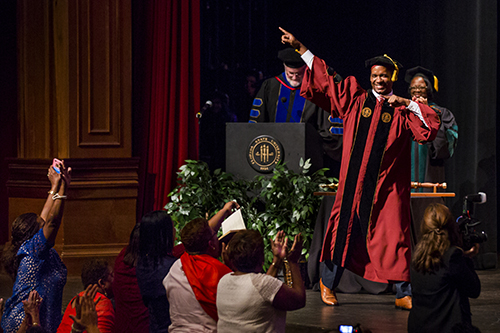 When the diplomas were handed out, regional campus deans took turns standing behind the grads onstage and hooding them. Exception: Twelve grads were hooded by a physician parent or uncle, a sibling alum or a spouse alum — and one, of course, was hooded by Lynn.
When the diplomas were handed out, regional campus deans took turns standing behind the grads onstage and hooding them. Exception: Twelve grads were hooded by a physician parent or uncle, a sibling alum or a spouse alum — and one, of course, was hooded by Lynn.
An enthusiastic ovation greeted the three graduates heading into military medicine. (See below.)
The day before the ceremony, 42 students were honored at an awards assembly. Sarah Evans and Sasha Kaiser led the class with five recognitions each. Clinton Dunn captured the equivalent of the MVP award: the J. Ocie Harris Outstanding Student Award. (See awards summary below.)
Sprinkled among the new M.D.s were 12 younger faces, the master’s students graduating from the Bridge Program. Ten days later, they’ll be back in school — this time as members of the College of Medicine’s Class of 2020.
The college now has 1,029 alumni.
View the graduation video
CLASS OF 2015 HONOREES
COLLEGE OF MEDICINE AWARDS
- J. Ocie Harris Outstanding Student Award: Clinton Dunn
- Myra M. Hurt Leadership in Medicine Award: John Dudley
- Nobles/Brown Altruism in Medicine Award: Shlermine Aupont, Sasha Kaiser
- Robin McDougall Access to Care Award: Cielo Gnecco, Ivana Simpson
- Mission Award: Kristen Dimas
- Individual Achievement Award: Ajejandro Chavarriaga
SPECIALTY AWARDS
- American Medical Women’s Association Glasgow-Rubin Achievement Citation (women in top 10 percent of graduating class): Julia Comer, Sarah Evans, Sasha Kaiser, Hanna Lee
- American Medical Women’s Association Outstanding Female Graduate: Casey Burnette
- Excellence in Emergency Medicine Award: Adam Field
- American College of Emergency Physicians Award: Sasha Kaiser
- Outstanding Graduate in Family Medicine: Casey Burnette, Tamra Travers
- Florida Geriatrics Society Award for Outstanding Student in Geriatrics: Casey Burnette, Marielys Figueroa-Sierra
- Internal Medicine Award: Jesse O’Shea
- Merritt Ryals Clements, M.D., Award for Excellence in Obstetrics and Gynecology: Claras Leandre, Carson Rodeffer
- American Congress of Obstetricians & Gynecologists District XII 2015 Outstanding Medical Student Achievement Award “to outstanding graduates entering OB-GYN residency program): Sarah Evans, Ivana Simpson
- Excellence in Pediatrics Award: Loren Farley, Raechel Irons
- Psychiatry Award (presented by North Central Florida Council of American Academy of Child and Adolescent Psychiatry): Matthew Harnach
- Clerkship Directors Psychiatry Award: Patricia Chipi
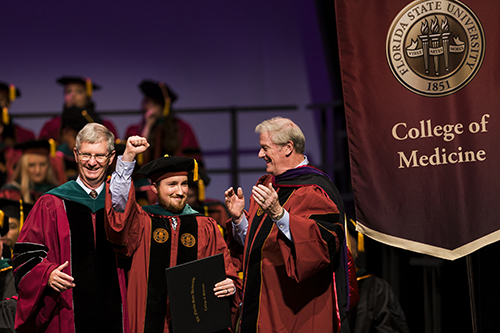 Excellence in Surgery Award: Eric Webb (below, right)
Excellence in Surgery Award: Eric Webb (below, right)
REGIONAL CAMPUS AWARDS
(For “the most outstanding student at each College of Medicine regional campus”):
- Daytona Beach – William Stross
- Fort Pierce – Shakirat Salvador
- Orlando – Clinton Dunn
- Pensacola – Sarah Evans
- Sarasota – Heather Lopez
- Tallahassee – Kyle Andrews
HONOR SOCIETIES
- Alpha Omega Alpha Honor Medical Society inductees (the only national honor medical society): Joah Aliancy, Kyle Andrews, Eric Branch, Julia Comer, Elizabeth Coughlin, Joshua Dault, Clinton Dunn, Sarah Evans, Andrew Golden, Sasha Kaiser, John Kanter, Hanna Lee, Jason Miles, Kathleen Murray, Jesse O’Shea, Mark Rohaus, Ivana Simpson, William Stross, Heather Tramel
- Gold Humanism Honor Society inductees (“excellence I n clinical care, leadership, compassion, and dedication to service”): Joah Aliancy, Shlermine Aupont, Casey Burnette, John-Anthony Coppola, Clinton Dunn, Gregorie Elie, Sarah Evans, Marielys Figueroa-Sierra, Cielo Gnecco, Sasha Kaiser, Hanna Lee, Clarissa Lomonaco, Heather Lopez, Todd Nanni, Jesse O’Shea, Carson Rodeffer, Makandall Saint Eloi, William Stross, Tamra Travers
MILITARY PINNING CEREMONY
Promotion in rank for students in the armed services:
- Air Force — Capt. Clarissa Lomonaco
- Navy — Lt. Ryan Fitzgerald, Lt. Todd Nanni
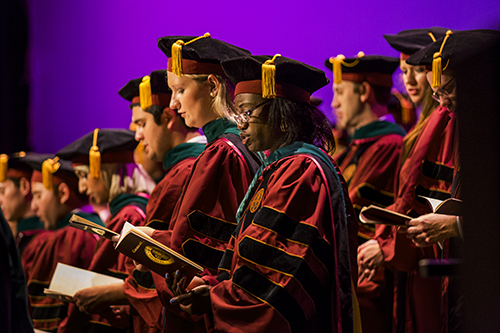 SUMMARY OF STUDENT HONOREES (in alphabetical order)
SUMMARY OF STUDENT HONOREES (in alphabetical order)
- Joah Aliancy: Alpha Omega Alpha Honor Medical Society, Gold Humanism Honor Society
- Kyle Andrews: Regional Campus Dean’s Award (Tallahassee), Alpha Omega Alpha Honor Medical Society
- Shlermine Aupont: Nobles/Brown Altruism in Medicine Award, Gold Humanism Honor Society
- Eric Branch: Alpha Omega Alpha Honor Medical Society
- Casey Burnette: Outstanding Graduate in Family Medicine, Florida Geriatrics Society Award for Outstanding Student in Geriatrics, American Medical Women’s Association Outstanding Female Graduate, Gold Humanism Honor Society
- Alejandro Chavarriaga: Individual Achievement Award
- Patricia Chipi: Clerkship Directors Psychiatry Award
- Julia Comer: American Medical Women’s Association Glasgow-Rubin Achievement Citation, Alpha Omega Alpha Honor Medical Society
- John-Anthony Coppola: Gold Humanism Honor Society
- Elizabeth Coughlin: Alpha Omega Alpha Honor Medical Society
- Joshua Dault: Alpha Omega Alpha Honor Medical Society
- Kristen Dimas: Mission Award
- John Dudley: Myra M. Hurt Leadership in Medicine Award
- Clinton Dunn: J. Ocie Harris Outstanding Student Award, Regional Campus Dean’s Award (Orlando), Alpha Omega Alpha Honor Medical Society, Gold Humanism Honor Society
- Gregorie Elie: Gold Humanism Honor Society
- Sarah Evans: Regional Campus Dean’s Award (Pensacola), American Congress of Obstetricians & Gynecologists District XII 2015 Outstanding Medical Student Achievement Award, American Medical Women’s Association Glasgow-Rubin Achievement Citation, Alpha Omega Alpha Honor Medical Society, Gold Humanism Honor Society
- Loren Farley: Excellence in Pediatrics Award
- Adam Field: Excellence in Emergency Medicine Award
- Marielys Figueroa-Sierra: Florida Geriatrics Society Award for Outstanding Student in Geriatrics, Gold Humanism Honor Society
- Cielo Gnecco: Access to Care Award, Gold Humanism Honor Society
- Andrew Golden: Alpha Omega Alpha Honor Medical Society
- Matthew Harnach: Psychiatry Award
- Raechel Irons: Excellence in Pediatrics Award
- Sasha Kaiser: Nobles/Brown Altruism in Medicine Award, American College of Emergency Physicians Award, American Medical Women’s Association Glasgow-Rubin Achievement Citation, Alpha Omega Alpha Honor Medical Society, Gold Humanism Honor Society
- John Kanter: Alpha Omega Alpha Honor Medical Society
- Claras Leandre: Merritt Ryals Clements, M.D., Award for Excellence in Obstetrics and Gynecology
- Hanna Lee: American Medical Women’s Association Glasgow-Rubin Achievement Citation, Alpha Omega Alpha Honor Medical Society, Gold Humanism Honor Society
- Clarissa Lomonaco: Gold Humanism Honor Society
- Heather Lopez: Regional Campus Dean’s Award (Sarasota), Gold Humanism Honor Society
- Jason Miles: Alpha Omega Alpha Honor Medical Society
- Kathleen Murray: Alpha Omega Alpha Honor Medical Society
- Todd Nanni: Gold Humanism Honor Society
- Jesse O’Shea: Internal Medicine Award, Alpha Omega Alpha Honor Medical Society, Gold Humanism Honor Society
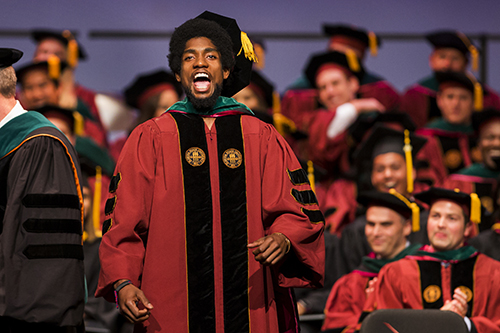 Carson Rodeffer: Merritt Ryals Clements, M.D., Award for Excellence in Obstetrics and Gynecology, Gold Humanism Honor Society
Carson Rodeffer: Merritt Ryals Clements, M.D., Award for Excellence in Obstetrics and Gynecology, Gold Humanism Honor Society- Mark Rohaus: Alpha Omega Alpha Honor Medical Society
- Makandall Saint Eloi: Gold Humanism Honor Society
- Shakirat Salvador: Regional Campus Dean’s Award (Fort Pierce)
- Ivana Simpson: Access to Care Award, American Congress of Obstetricians & Gynecologists District XII 2015 Outstanding Medical Student Achievement Award, Alpha Omega Alpha Honor Medical Society
- William Stross: Regional Campus Dean’s Award (Daytona Beach), Alpha Omega Alpha Honor Medical Society, Gold Humanism Honor Society
- Heather Tramel: Alpha Omega Alpha Honor Medical Society
- Tamra Travers: Outstanding Graduate in Family Medicine, Gold Humanism Honor Society
- Eric Webb: Excellence in Surgery Award
COMMENCEMENT ADDRESS
By Ricardo Gonzalez-Rothi, M.D.
(He delivered this speech without notes, by the way. He didn’t match this version word for word, but he was mighty close.)
On that table, every single one of you has a diploma with your name and the letters “M.D.” after it. You all know that “M. D.” stands for “medical doctor.” But you may not know that it also stands for “merciful and devoted.” Remember this every time you sign your name from this day forward.
In gathering my thoughts for what deep message I could possibly leave with you this morning, I thought long and hard about what the speaker at my medical school commencement said. It occurred to me that I could not remember who the speaker was. I do remember that it took almost 15 minutes to introduce him … but I do not remember what he had to say. It is likely that years from now you will not remember what I had to say today, either. So … I will dispense with the obligatory commencement monologue and tell you a story, leave you with a gift.
Growing up in Cuba, when I was in the second grade, I developed a horrible school bus phobia. I was the second child on the bus every morning, and the last one to get off at the end of the day. Although I went to a nice school, it was in a very rough part of town. I always feared the bus would break down and I would be left stranded, or that the bus driver would forget to let me off, walk away and lock the bus for the day…
We didn’t own a car. I had to ride the bus. My mother, a teacher, decided rather than coddling me, she would give me the tools to deal with my anxiety. She prepared for me a small bag with objects to bolster my confidence. There was a comic book to distract me, an eraser to rub off my fears, and one of my favorite toy soldiers to watch over me….
So why am I telling you this? After you turn in your gowns today, and you hug each other and cry for joy, and you go out to lunch and you pack your things and you get on your way … trust me, there will be an “alone moment” sometime between now and the day you start your internship, and then it will hit you: It will be your turn to board the bus that will take you through the rest of your lives as physicians. So … I have prepared this “confidence boosting” bag to help you along the way…
In this bag is a packet of attitude-adjustment powder. Dissolve in liquid and drink twice daily. A good attitude is the most indispensable item. Without it you are destined to fail miserably. You will not be happy, and others will be unhappy with you. Things are bound to happen to you and to your patients that you have not expected, some of which you can’t change. If you cannot change what happened, it is always in your power and under your control to change your attitude about it. Remember that.
Think about the people you like and respect. Think about those people whom you admire because of the way they handle hardship and crisis…. I would venture to guess all of them have a good attitude. Grow a good attitude. Practice till it becomes a habit. Infect others with your attitude.
The second item in this packet is a discount coupon for a Dr. Stead’s famous “Never-let-them-see-you-sweat antiperspirant bar.” Dr. Eugene Stead was a venerable clinician-educator with a deep commitment to the things that matter most in our profession. I once had the good fortune to hear him speak when I was an intern and he was a visiting professor during my internship. I will always remember something he said. (It was particularly memorable to me because earlier that day my chief resident had come down hard on me because I failed to make a critical decision on one of my patients.)
Dr. Stead said: “A doctor doesn’t really need much knowledge, as he can look up most things … but he must have great emotional stability to perform in an air of uncertainty.” It is straightforward to make decisions when facts and decisions are in the black or white. Biology is generally like that: black or white. The blood potassium is either low or it is normal. The biopsy shows cancer or normal breast tissue. The practice of medicine consists of biology and sociology wrapped around a living human being. Medicine is more often grey than black-and-white. Teach yourselves to live and function in the grey zone…
As you practice your craft, remember to resist the temptation at one extreme to be paralyzed by indecision or to be tricked by overconfidence at the other extreme. Let’s face it: On the first day of your internship, the nurses will know soon enough how much you don’t know. You will know how much you don’t know. A curious thing about our profession is that not a day goes by that you will not be humbled by learning something you didn’t know about an illness. Without fail, this has been a weekly occurrence for me for the past 39 years, 4 months and 21 days…
Embrace knowing what you don’t know as a great opportunity to enrich yourselves by accepting the gaps in your knowledge with humility. Knowledge is the strongest tool for arming yourselves with the ability to perform in an air of uncertainty. If you don’t remember where to get knowledge, Nancy Clark tells me she has an app for that…
The last item is a spirit medallion. The word “spirit” comes from the Latin “spirare,” meaning ”to breathe.” From this come all the associations of spirit with the breath of life, this great gift bestowed on us as an expression of what is holy. The word “holy,” in turn, is synonymous with “health” and “healing.”
For the past four years you have been bludgeoned with the essentials of “biochemistrology, embryology, pharmacology, obstetrics and gynecology, internal medicinology and surgerology” as a means of giving you the tools to begin to understand and cure illnesses. Along the way we have also tried to instill in you the spiritual elements of healing illness. “Curing” requires intelligence, the skepticism of a detective, and knowledge. Healing requires spirit. Not everyone you cure is healed, as not everyone you heal can be cured. Get in touch with your spirit. Let your patients know you care about theirs.
Well, I can see that Kema Gadson is reminding me that your bus is here. So, remember three things:
• Grow a good attitude.
• Learn to function in an air of uncertainty.
• Nurture your spirit and know the spirit of your patients.
Oh … one last thing. I have been saving this fortune cookie since I came back from a medical school graduation in Cleveland a few days ago. I had bought one for each of the graduating seniors, but during a pat-down by TSA, the package was crushed and this is the only one that survived. So I will share it with the whole class… It says: “It is never too early to start saving up for the things that money can’t buy.”
For the past four years we have given you roots…. Today we give you wings. Do not forget your roots. FSU will always be your home. And we’ll leave the light on for you.
CLASS PRESIDENT’S ADDRESS
By Alejandro Chavarriaga
Thank you all for being here with us today to celebrate this indescribably special day, and thank you to all of you at home watching as well. Your presence is surely felt!
The Class of 2016, our class, can be best described as a humble, honest, devoted group of brilliant and inspiringly hard-working individuals. We are dads and moms, husbands and wives, published scientists, lawyers and Army Rangers, just to name a few. I’m profoundly humbled to stand before you today, and I’m forever grateful for your trust in allowing me to be your president these past four years.
Class of 2016, today we earn those two unmistakable letters that we will affix to the end of our names. Those two letters we have all dreamed of and worked so tirelessly for. Today we become M.D.s, and we are indebted to this incredible institution for giving us the opportunity to realize this dream of ours. Although we are literally in debt, I mean this figuratively. Four years ago we were merely applicants with big dreams, but today we are doctors, colleagues and friends, and we couldn’t have gotten here without our great school and faculty.
Yet if we’ve learned anything at all, it’s that we must practice with an evidence-based approach. So I’ve come prepared with the evidence to prove that we are graduating from the best school in the country:
- To begin, we attend the No. 2 most competitive medical school, second only to the Mayo Clinic in Rochester, Minnesota. Of roughly 6,300 applicants, fewer than 3 percent have the opportunity we were granted of going on this exciting journey.
- Second, we have a phenomenal dean and faculty that prioritize us as students. For instance, our dean still hasn’t banned our Frisbees and footballs from the courtyard, even though they’ve been known to hit a window or two. (But let’s not give him any ideas.)
- Lastly, we have a one-of-a-kind student affairs department. They hold biweekly meetings with the student leadership to hear our thoughts, concerns and ideas, and they actually do something about them.
I could go on and on, but for now let me just say, on behalf of my classmates, thank you so much. Thank you so much for believing in us and taking a chance on us, for investing in us, for teaching us the most beautiful profession, and for allowing us to achieve this momentous triumph. You are much more than our medical school: You are our family.
And in regard to family, there is no other group of people who deserve our gratitude more. You are our axial skeletons that support us and keep us from breaking. Today is as much a celebration for you as it is for us. Without you we simply wouldn’t be on this stage today. So for all of the family and friends: Congratulations and thank you. Our success is shared with you. With that let me also say: Please don’t go anywhere. Residency is around the corner, and care packages are still welcome.
One last person who deserves our gratitude is Kema Gadson. Officially she is our student support coordinator, but we immediately knew she would far surpass that. Kema is our friend, our confidant, and on more than one occasion our mom away from home. She has been there for us unconditionally from the start and has gone above and beyond. Since we were her first class, she has a special place in her heart for us, and we too have a special place in our hearts for her. Thank you so much, Kema. We will truly miss you!
Looking back, our transformation into doctors began with that summer semester during which we took Gross Anatomy and Doctoring. We met our first patients and became experts in inspection, percussion, palpation and auscultation — but not before learning our favorite color, personality type and learning style.
We quickly learned that what took us an hour or two to dissect took Dr. Romrell 30 seconds with nothing more than his index finger, as opposed to our arsenal of dissection equipment. And if we were lucky enough to find something unique or aberrant, we knew to get his attention — as he would patiently explain the entire dissection field and reward us with that unmistakable sound of metal hitting metal as he banged on the table to get everyone’s attention. He would end each announcement with high praise for the talented dissection team that had found the structure. Of course, these announcements quickly became the currency of the cadaver lab, and every day we would all strive to be that talented team. As Dr. Laywell would put it, our anatomy summer camp was the Next Level Shizzle!
Even though it was only a few short months, this transition into medical school was anything but easy. By the time it was over, we were rewarded with one of our most memorable moments — our White Coat Ceremony, our first success of many, and a rite of passage into the most beautiful profession.
First and second year felt like a blur, especially after Step 1. But I can still hear Dr. Overton’s voice echoing in my hippocampus: “Guys, I just have to have this, I need this from you, you just have to give it to me” — in his attempt to teach us his own language of physiology. Let me just say it was a lot of Y and X axes, curves, formulas and, as he would call it, arithmetic.
During these years we enjoyed four to six hours of daily lecture with 70 to 100 PowerPoint slides per hour. After computing that arithmetic, we easily digested over 100,000 slides jam-packed with vital information we now use to take care of our patients. It all culminated with Step 1, which was another Everest in our journey, but we got through it. It was our final examination before we left the classroom and entered the clinical world.
It felt like we were starting all over again. We were two years into becoming doctors, yet we couldn’t even find the patient in the hospital, let alone a Band-Aid or roll of gauze. Let me tell you, there isn’t anything more humbling than having to ask for directions when you’re wearing a white coat in a hospital. I’m also sure we all got the “May I help you, sweetheart?” when we had that lost look on our face at 4:00 in the morning. The way I see it, we were paying our dues and earning the right to wear those coats.
Fourth year came and we didn’t even see it coming. We all thought it would be the best year, the year we could wind down and travel. This was true, partially, since it first smacked us with VSAS, Externships, ERAS, Interviews and Step 2 — which, by the way, is two exams in one, costs about $2,000, and you have to fly to get to it. Yet we got a taste of what it would be like to be a resident. We learned how to be clinicians, how to diagnose and how to treat. It all started to become second nature, and without having to recite our notes quietly in our heads we just knew what test to order, how to interpret it and what to do about it. We still lack the experience to truly be autonomous and call ourselves experts, but that’s what residency is for. All in all, med school has been round after round of hard work, sacrifice and reward.
Our future promises continued studying, harder exams, 80-hour workweeks and even more sleepless nights, topped off with the new responsibility of holding a human being’s life in our hands. This is what makes our profession so beautiful and inspiring. This is why we all chose this life.
Class of 2016, in the coming years we will be overworked, exhausted and sleep-deprived. It will seem that what is asked of us is impossible as we encounter many morally challenging situations. I challenge us to never let these pressures blind us to why we chose this beautiful profession. I challenge us to stand up for our patients, take ownership of their care and help them get through their worst day, even if that’s saving them from themselves.
Remember our journey that got us here. Remember all the people who prioritized us, advocated for us, believed in us and took a chance on us. Let’s never forget their investment in us, and let’s pay it forward with our patients. As doctors, this is our job; as human beings, this is our calling.
Colleagues, I cannot wait to see what our bright futures have in store for us. It has truly been an honor to experience this journey with you.
Remember, if you’re ever in need of someone to take care of a gallbladder, appendix, hernia or basically anything that will require general anesthesia, I’m your man! My phone number is the same, and my email won’t change; the consult is much appreciated!
Thank you and congratulations!! GO NOLES!!

